International Economics: Report on the GCC Summit and its Implications
VerifiedAdded on 2023/06/05
|6
|1191
|367
Report
AI Summary
This report examines the 2017 GCC Summit held in Kuwait, focusing on the challenges and future prospects of the Gulf Cooperation Council (GCC). The introduction highlights the summit's difficulties, including low-level delegations and failed mediation efforts. The analysis delves into the peak crisis, discussing the threats to GCC's creation, the failed negotiation attempts, and the emergence of an economic war. The report further explores the future prospects, highlighting the absence of heads of GCC countries, the emergence of two distinct blocs within the council, and the economic implications of the crisis. The conclusion emphasizes the paralysis of the GCC, the potential for regional fragmentation, and the impact of oil price fluctuations on the member countries' economies and socio-political reforms. The report references key academic sources to support its analysis.
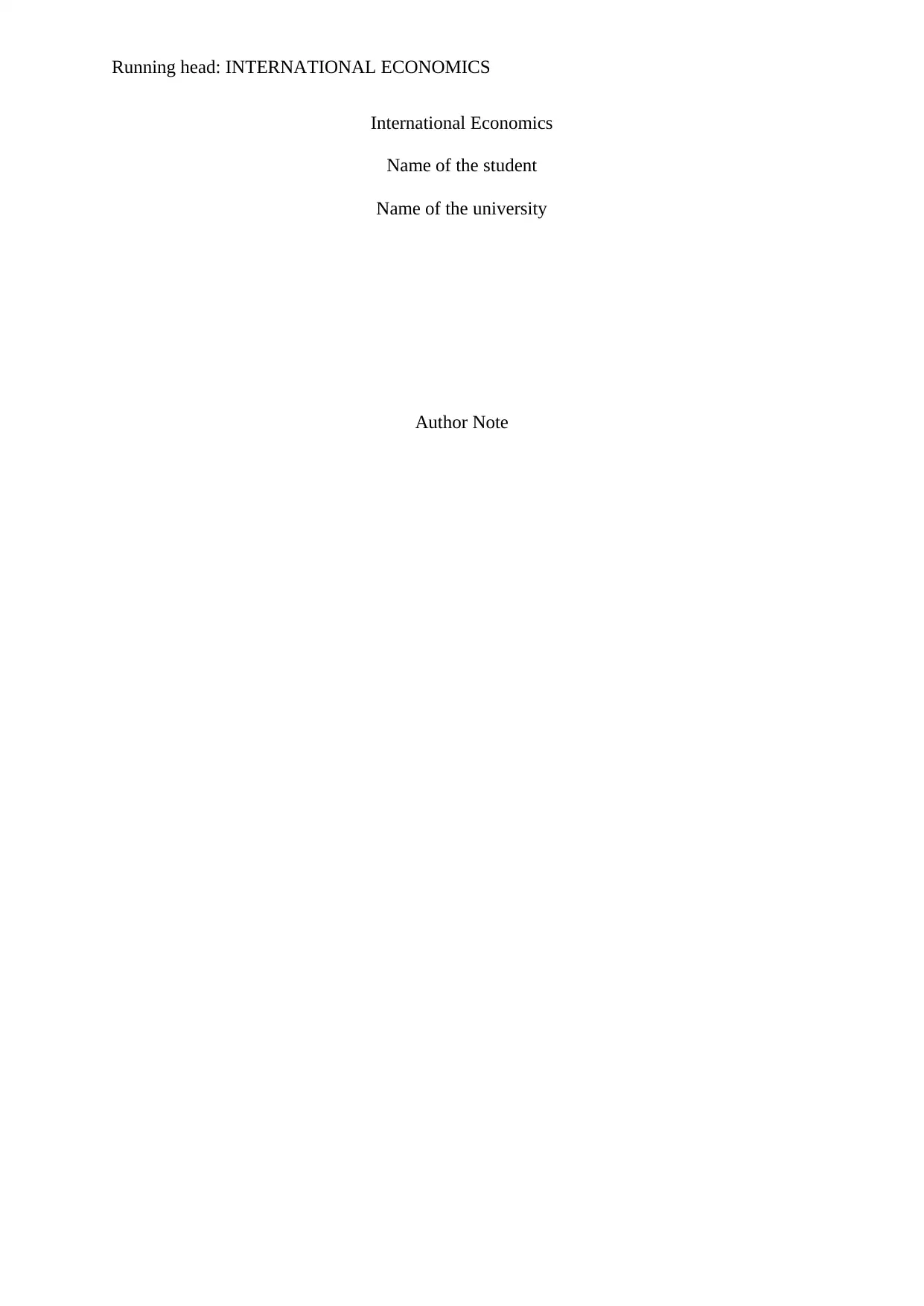
Running head: INTERNATIONAL ECONOMICS
International Economics
Name of the student
Name of the university
Author Note
International Economics
Name of the student
Name of the university
Author Note
Paraphrase This Document
Need a fresh take? Get an instant paraphrase of this document with our AI Paraphraser
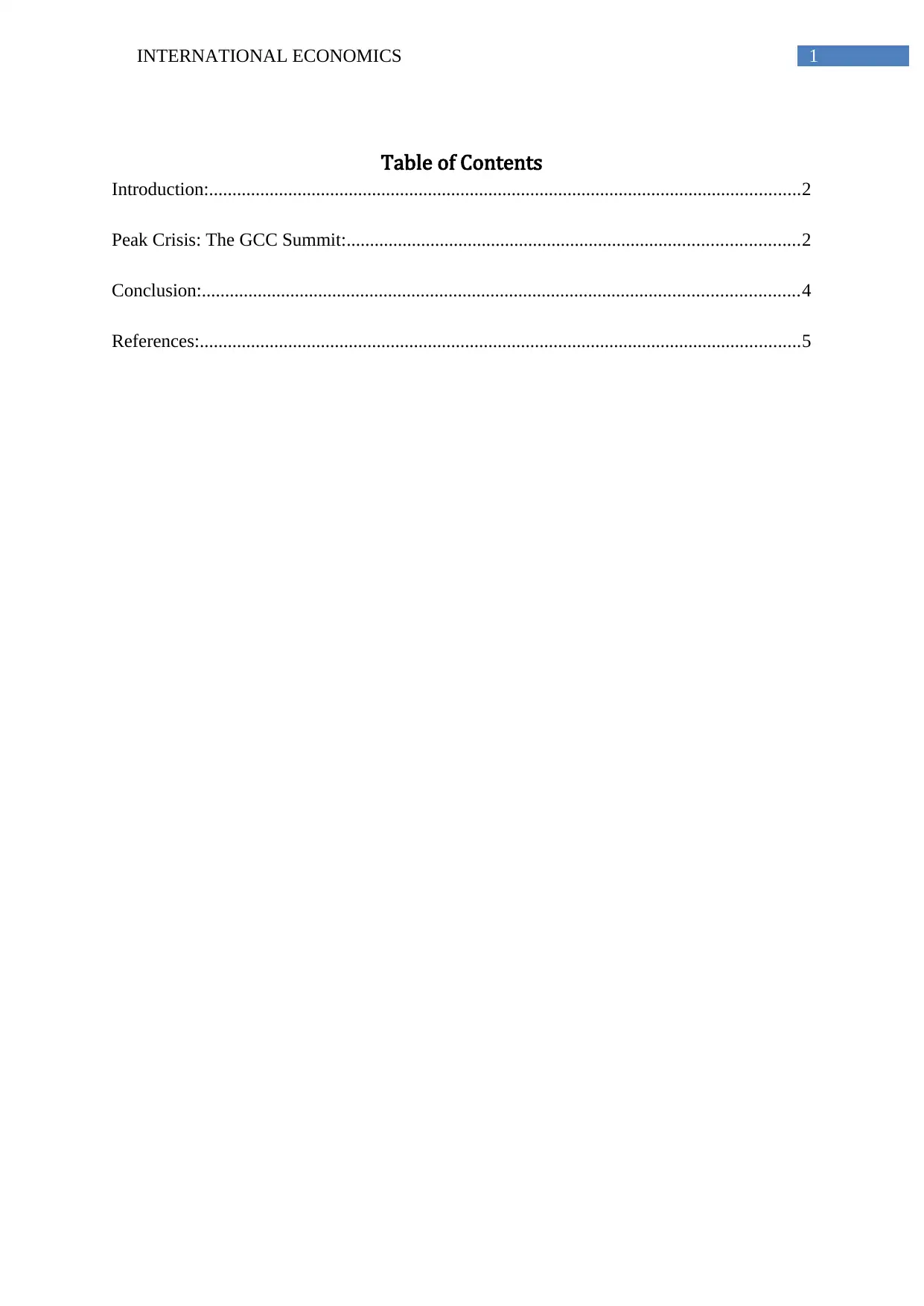
1INTERNATIONAL ECONOMICS
Table of Contents
Introduction:...............................................................................................................................2
Peak Crisis: The GCC Summit:.................................................................................................2
Conclusion:................................................................................................................................4
References:.................................................................................................................................5
Table of Contents
Introduction:...............................................................................................................................2
Peak Crisis: The GCC Summit:.................................................................................................2
Conclusion:................................................................................................................................4
References:.................................................................................................................................5
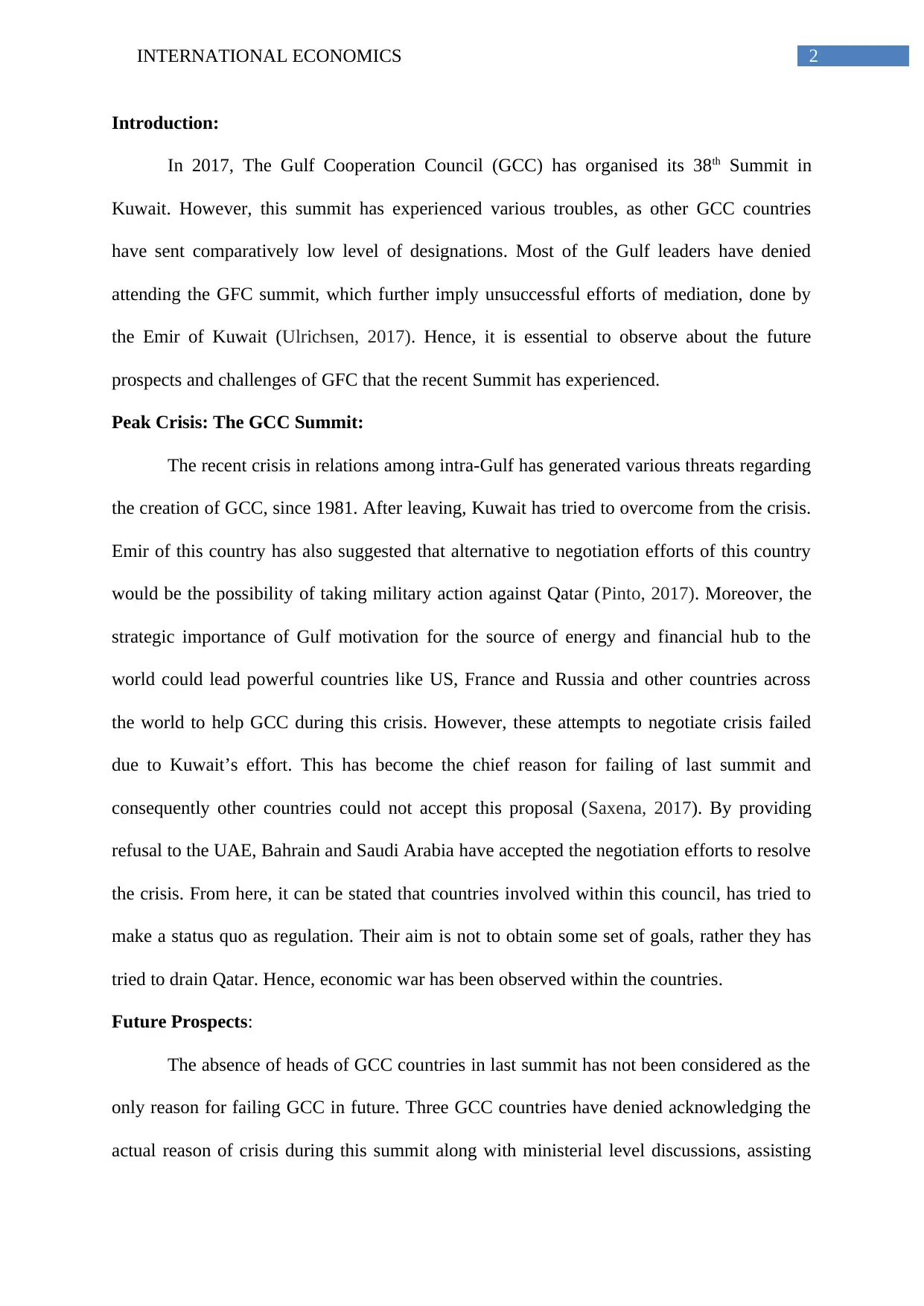
2INTERNATIONAL ECONOMICS
Introduction:
In 2017, The Gulf Cooperation Council (GCC) has organised its 38th Summit in
Kuwait. However, this summit has experienced various troubles, as other GCC countries
have sent comparatively low level of designations. Most of the Gulf leaders have denied
attending the GFC summit, which further imply unsuccessful efforts of mediation, done by
the Emir of Kuwait (Ulrichsen, 2017). Hence, it is essential to observe about the future
prospects and challenges of GFC that the recent Summit has experienced.
Peak Crisis: The GCC Summit:
The recent crisis in relations among intra-Gulf has generated various threats regarding
the creation of GCC, since 1981. After leaving, Kuwait has tried to overcome from the crisis.
Emir of this country has also suggested that alternative to negotiation efforts of this country
would be the possibility of taking military action against Qatar (Pinto, 2017). Moreover, the
strategic importance of Gulf motivation for the source of energy and financial hub to the
world could lead powerful countries like US, France and Russia and other countries across
the world to help GCC during this crisis. However, these attempts to negotiate crisis failed
due to Kuwait’s effort. This has become the chief reason for failing of last summit and
consequently other countries could not accept this proposal (Saxena, 2017). By providing
refusal to the UAE, Bahrain and Saudi Arabia have accepted the negotiation efforts to resolve
the crisis. From here, it can be stated that countries involved within this council, has tried to
make a status quo as regulation. Their aim is not to obtain some set of goals, rather they has
tried to drain Qatar. Hence, economic war has been observed within the countries.
Future Prospects:
The absence of heads of GCC countries in last summit has not been considered as the
only reason for failing GCC in future. Three GCC countries have denied acknowledging the
actual reason of crisis during this summit along with ministerial level discussions, assisting
Introduction:
In 2017, The Gulf Cooperation Council (GCC) has organised its 38th Summit in
Kuwait. However, this summit has experienced various troubles, as other GCC countries
have sent comparatively low level of designations. Most of the Gulf leaders have denied
attending the GFC summit, which further imply unsuccessful efforts of mediation, done by
the Emir of Kuwait (Ulrichsen, 2017). Hence, it is essential to observe about the future
prospects and challenges of GFC that the recent Summit has experienced.
Peak Crisis: The GCC Summit:
The recent crisis in relations among intra-Gulf has generated various threats regarding
the creation of GCC, since 1981. After leaving, Kuwait has tried to overcome from the crisis.
Emir of this country has also suggested that alternative to negotiation efforts of this country
would be the possibility of taking military action against Qatar (Pinto, 2017). Moreover, the
strategic importance of Gulf motivation for the source of energy and financial hub to the
world could lead powerful countries like US, France and Russia and other countries across
the world to help GCC during this crisis. However, these attempts to negotiate crisis failed
due to Kuwait’s effort. This has become the chief reason for failing of last summit and
consequently other countries could not accept this proposal (Saxena, 2017). By providing
refusal to the UAE, Bahrain and Saudi Arabia have accepted the negotiation efforts to resolve
the crisis. From here, it can be stated that countries involved within this council, has tried to
make a status quo as regulation. Their aim is not to obtain some set of goals, rather they has
tried to drain Qatar. Hence, economic war has been observed within the countries.
Future Prospects:
The absence of heads of GCC countries in last summit has not been considered as the
only reason for failing GCC in future. Three GCC countries have denied acknowledging the
actual reason of crisis during this summit along with ministerial level discussions, assisting
⊘ This is a preview!⊘
Do you want full access?
Subscribe today to unlock all pages.

Trusted by 1+ million students worldwide
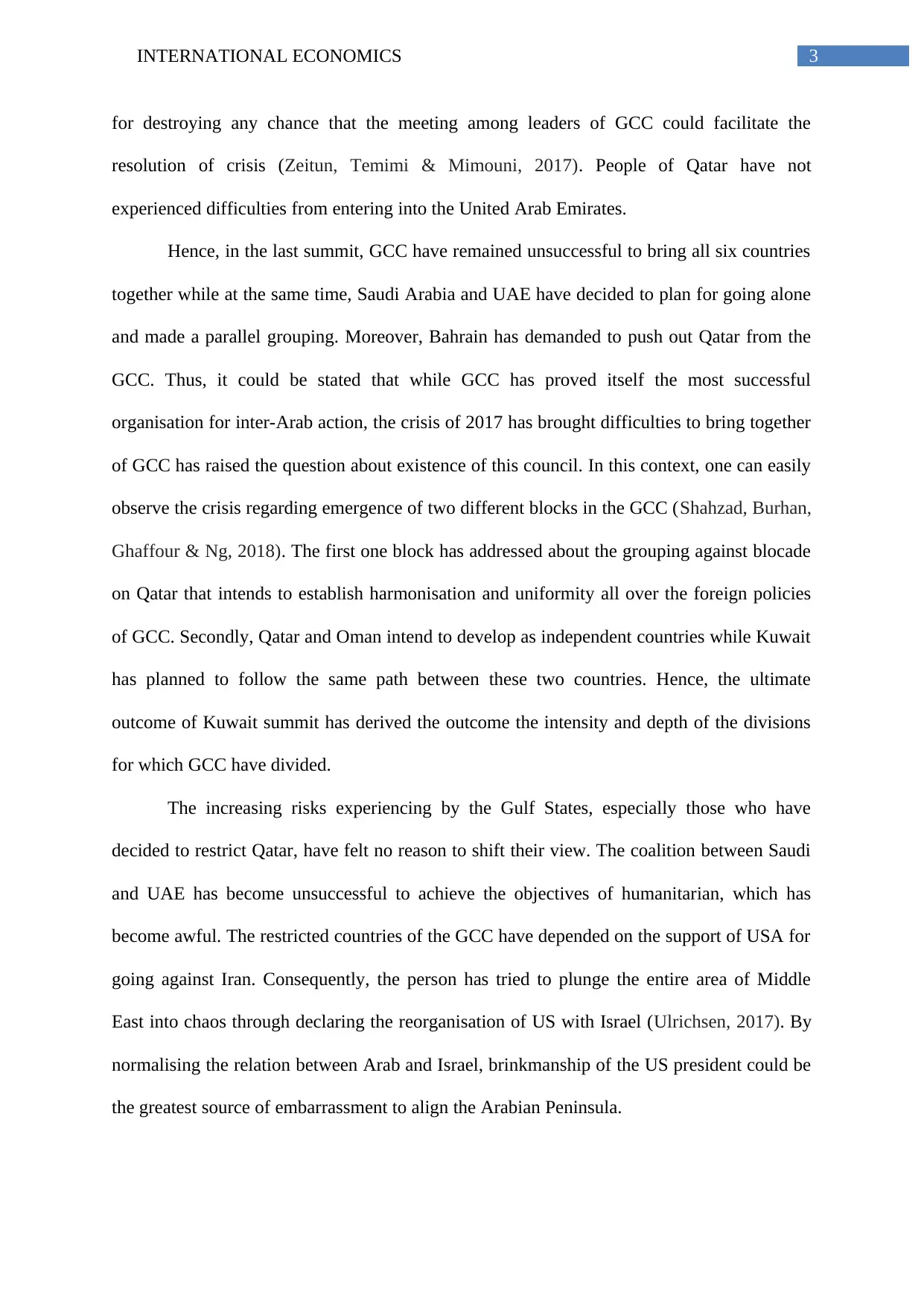
3INTERNATIONAL ECONOMICS
for destroying any chance that the meeting among leaders of GCC could facilitate the
resolution of crisis (Zeitun, Temimi & Mimouni, 2017). People of Qatar have not
experienced difficulties from entering into the United Arab Emirates.
Hence, in the last summit, GCC have remained unsuccessful to bring all six countries
together while at the same time, Saudi Arabia and UAE have decided to plan for going alone
and made a parallel grouping. Moreover, Bahrain has demanded to push out Qatar from the
GCC. Thus, it could be stated that while GCC has proved itself the most successful
organisation for inter-Arab action, the crisis of 2017 has brought difficulties to bring together
of GCC has raised the question about existence of this council. In this context, one can easily
observe the crisis regarding emergence of two different blocks in the GCC (Shahzad, Burhan,
Ghaffour & Ng, 2018). The first one block has addressed about the grouping against blocade
on Qatar that intends to establish harmonisation and uniformity all over the foreign policies
of GCC. Secondly, Qatar and Oman intend to develop as independent countries while Kuwait
has planned to follow the same path between these two countries. Hence, the ultimate
outcome of Kuwait summit has derived the outcome the intensity and depth of the divisions
for which GCC have divided.
The increasing risks experiencing by the Gulf States, especially those who have
decided to restrict Qatar, have felt no reason to shift their view. The coalition between Saudi
and UAE has become unsuccessful to achieve the objectives of humanitarian, which has
become awful. The restricted countries of the GCC have depended on the support of USA for
going against Iran. Consequently, the person has tried to plunge the entire area of Middle
East into chaos through declaring the reorganisation of US with Israel (Ulrichsen, 2017). By
normalising the relation between Arab and Israel, brinkmanship of the US president could be
the greatest source of embarrassment to align the Arabian Peninsula.
for destroying any chance that the meeting among leaders of GCC could facilitate the
resolution of crisis (Zeitun, Temimi & Mimouni, 2017). People of Qatar have not
experienced difficulties from entering into the United Arab Emirates.
Hence, in the last summit, GCC have remained unsuccessful to bring all six countries
together while at the same time, Saudi Arabia and UAE have decided to plan for going alone
and made a parallel grouping. Moreover, Bahrain has demanded to push out Qatar from the
GCC. Thus, it could be stated that while GCC has proved itself the most successful
organisation for inter-Arab action, the crisis of 2017 has brought difficulties to bring together
of GCC has raised the question about existence of this council. In this context, one can easily
observe the crisis regarding emergence of two different blocks in the GCC (Shahzad, Burhan,
Ghaffour & Ng, 2018). The first one block has addressed about the grouping against blocade
on Qatar that intends to establish harmonisation and uniformity all over the foreign policies
of GCC. Secondly, Qatar and Oman intend to develop as independent countries while Kuwait
has planned to follow the same path between these two countries. Hence, the ultimate
outcome of Kuwait summit has derived the outcome the intensity and depth of the divisions
for which GCC have divided.
The increasing risks experiencing by the Gulf States, especially those who have
decided to restrict Qatar, have felt no reason to shift their view. The coalition between Saudi
and UAE has become unsuccessful to achieve the objectives of humanitarian, which has
become awful. The restricted countries of the GCC have depended on the support of USA for
going against Iran. Consequently, the person has tried to plunge the entire area of Middle
East into chaos through declaring the reorganisation of US with Israel (Ulrichsen, 2017). By
normalising the relation between Arab and Israel, brinkmanship of the US president could be
the greatest source of embarrassment to align the Arabian Peninsula.
Paraphrase This Document
Need a fresh take? Get an instant paraphrase of this document with our AI Paraphraser
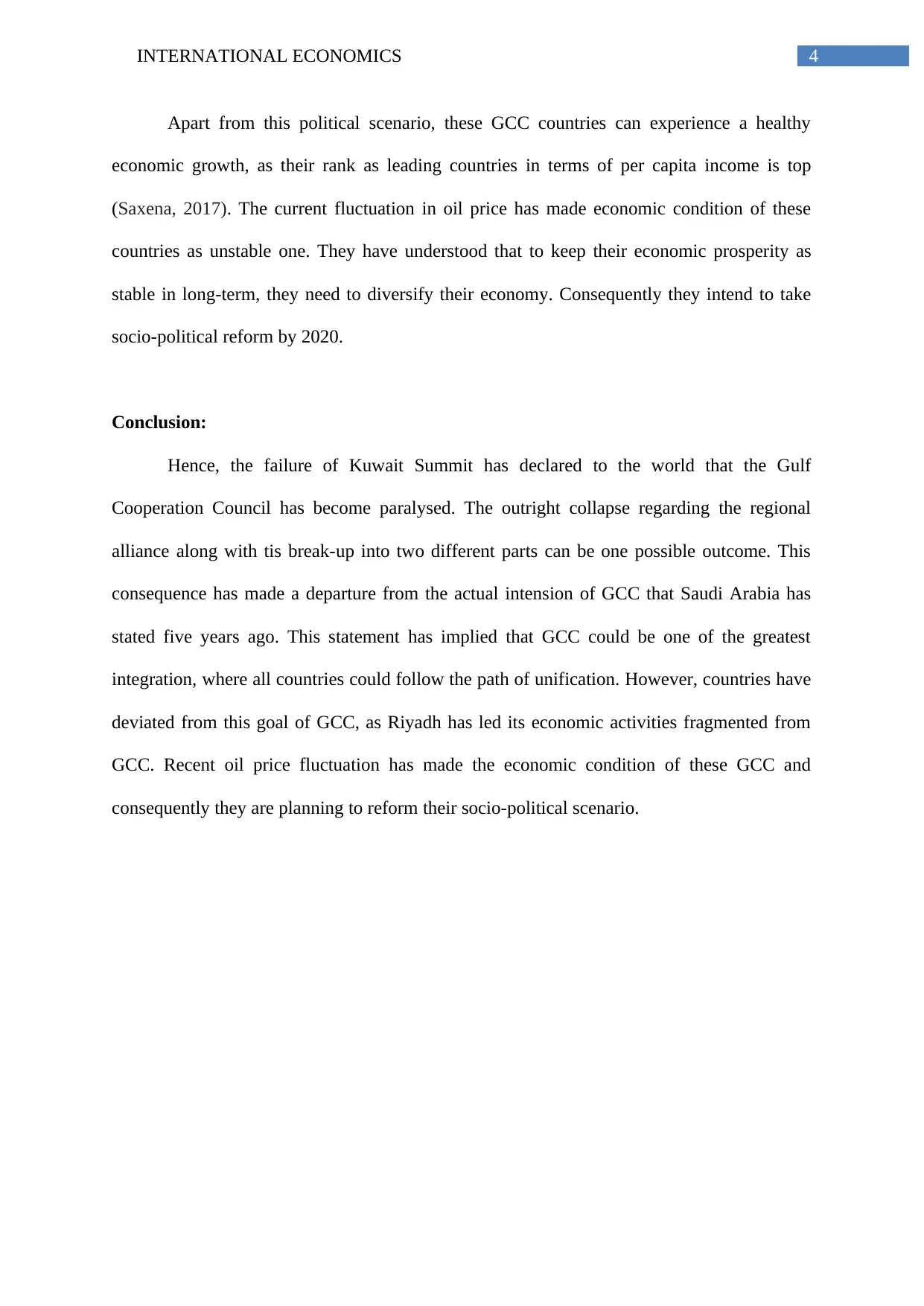
4INTERNATIONAL ECONOMICS
Apart from this political scenario, these GCC countries can experience a healthy
economic growth, as their rank as leading countries in terms of per capita income is top
(Saxena, 2017). The current fluctuation in oil price has made economic condition of these
countries as unstable one. They have understood that to keep their economic prosperity as
stable in long-term, they need to diversify their economy. Consequently they intend to take
socio-political reform by 2020.
Conclusion:
Hence, the failure of Kuwait Summit has declared to the world that the Gulf
Cooperation Council has become paralysed. The outright collapse regarding the regional
alliance along with tis break-up into two different parts can be one possible outcome. This
consequence has made a departure from the actual intension of GCC that Saudi Arabia has
stated five years ago. This statement has implied that GCC could be one of the greatest
integration, where all countries could follow the path of unification. However, countries have
deviated from this goal of GCC, as Riyadh has led its economic activities fragmented from
GCC. Recent oil price fluctuation has made the economic condition of these GCC and
consequently they are planning to reform their socio-political scenario.
Apart from this political scenario, these GCC countries can experience a healthy
economic growth, as their rank as leading countries in terms of per capita income is top
(Saxena, 2017). The current fluctuation in oil price has made economic condition of these
countries as unstable one. They have understood that to keep their economic prosperity as
stable in long-term, they need to diversify their economy. Consequently they intend to take
socio-political reform by 2020.
Conclusion:
Hence, the failure of Kuwait Summit has declared to the world that the Gulf
Cooperation Council has become paralysed. The outright collapse regarding the regional
alliance along with tis break-up into two different parts can be one possible outcome. This
consequence has made a departure from the actual intension of GCC that Saudi Arabia has
stated five years ago. This statement has implied that GCC could be one of the greatest
integration, where all countries could follow the path of unification. However, countries have
deviated from this goal of GCC, as Riyadh has led its economic activities fragmented from
GCC. Recent oil price fluctuation has made the economic condition of these GCC and
consequently they are planning to reform their socio-political scenario.
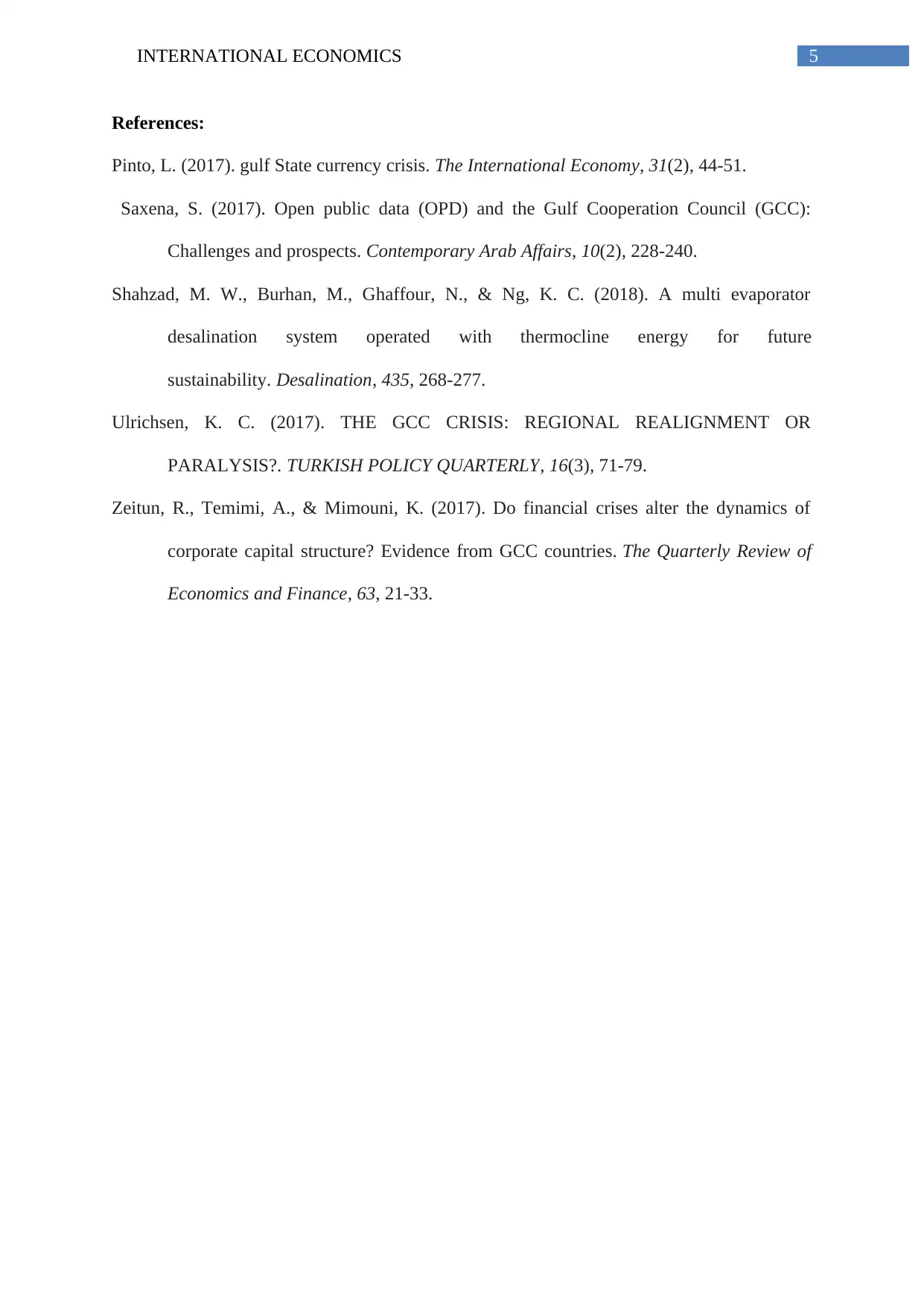
5INTERNATIONAL ECONOMICS
References:
Pinto, L. (2017). gulf State currency crisis. The International Economy, 31(2), 44-51.
Saxena, S. (2017). Open public data (OPD) and the Gulf Cooperation Council (GCC):
Challenges and prospects. Contemporary Arab Affairs, 10(2), 228-240.
Shahzad, M. W., Burhan, M., Ghaffour, N., & Ng, K. C. (2018). A multi evaporator
desalination system operated with thermocline energy for future
sustainability. Desalination, 435, 268-277.
Ulrichsen, K. C. (2017). THE GCC CRISIS: REGIONAL REALIGNMENT OR
PARALYSIS?. TURKISH POLICY QUARTERLY, 16(3), 71-79.
Zeitun, R., Temimi, A., & Mimouni, K. (2017). Do financial crises alter the dynamics of
corporate capital structure? Evidence from GCC countries. The Quarterly Review of
Economics and Finance, 63, 21-33.
References:
Pinto, L. (2017). gulf State currency crisis. The International Economy, 31(2), 44-51.
Saxena, S. (2017). Open public data (OPD) and the Gulf Cooperation Council (GCC):
Challenges and prospects. Contemporary Arab Affairs, 10(2), 228-240.
Shahzad, M. W., Burhan, M., Ghaffour, N., & Ng, K. C. (2018). A multi evaporator
desalination system operated with thermocline energy for future
sustainability. Desalination, 435, 268-277.
Ulrichsen, K. C. (2017). THE GCC CRISIS: REGIONAL REALIGNMENT OR
PARALYSIS?. TURKISH POLICY QUARTERLY, 16(3), 71-79.
Zeitun, R., Temimi, A., & Mimouni, K. (2017). Do financial crises alter the dynamics of
corporate capital structure? Evidence from GCC countries. The Quarterly Review of
Economics and Finance, 63, 21-33.
⊘ This is a preview!⊘
Do you want full access?
Subscribe today to unlock all pages.

Trusted by 1+ million students worldwide
1 out of 6
Related Documents
Your All-in-One AI-Powered Toolkit for Academic Success.
+13062052269
info@desklib.com
Available 24*7 on WhatsApp / Email
![[object Object]](/_next/static/media/star-bottom.7253800d.svg)
Unlock your academic potential
Copyright © 2020–2026 A2Z Services. All Rights Reserved. Developed and managed by ZUCOL.





